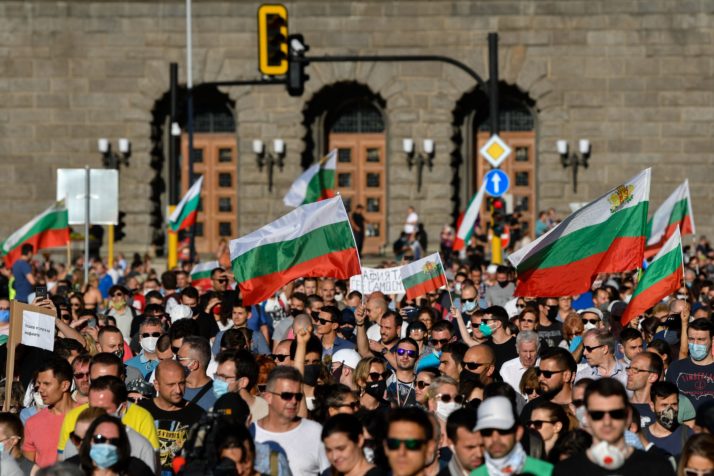“Get out! We’ll come to visit you in jail!” shouted a group of young Bulgarians at a recent rally, demanding not only the end of the government but a whole corrupt system.
Thirteen years after joining the European Union, Bulgarians are still among the bloc’s worst-off citizens, and patience is running thin with the shadowy oligarchs seen as pulling the political and economic strings.
Two weeks of sustained protests have been brightened by vuvuzelas, weird hairstyles and witty slogans — but they belie the anger of young protesters over a string of graft scandals in recent years.
Their numbers have been swelled by those forced to return from abroad after losing their jobs or seeing their universities shuttered under the impact of the new coronavirus.
The resignation of Prime Minister Boyko Borisov and the chief prosecutor are just the beginning of their demands, said Boris Lukanov, a 23-year-old medical student who came to the protests straight from the airport after returning from Germany.
“We need an interim cabinet and new elections with machine voting,” he told AFP, a reference to allegations of vote-rigging.
Like him, hundreds of thousands of Bulgarians have left to work and study abroad in recent years, and been horrified at how their native country compares.
“The young, who have lived in the West, experience a culture shock when faced with the vicious, blatant practices (back home),” said Parvan Simeonov, Bulgaria director for Gallup International.
Bulgaria has the worst scores in the European Union for corruption and the rule of law.
Simmering anger ignited earlier this month over the government’s handling of the coronavirus pandemic, with cases spiking after an abrupt end to its lockdown last month and many fearing its struggling health system will not cope.
“Our tolerance for scandals has a limit,” fumed 29-year-old finance worker Krasimir. “We are an EU country, even if we are the poorest one.”
He studied in the Netherlands where he was impressed to find “public institutions that serve the best interests of the citizens.”
Bulgarians still abroad have also joined the movement, with solidarity protests in several German cities, as well as in Brussels, Vienna and Copenhagen.
– Borisov stands firm –
Borisov has already had to resign twice during his 11-year dominance of Bulgarian politics, but he has refused to throw in the towel this time.
He has announced a sweeping cabinet reshuffle, but said he would not step down with a further virus-related crisis possibly around the corner.
In any case, critics want much more.
“It’s not a question of their resignation but of the mode of governing,” 34-year-old IT entrepreneur Pasko Paskov told AFP, blaming stifling bureaucracy and poor leadership for Bulgaria’s failure to win foreign investment, which has collapsed in recent years.
For some, however, the protests are a sign of hope.
Nikola Dimitrov, a 29-year-old who returned from his studies in London four years ago to work in a clinical trials company, says he is determined to stay despite asking himself numerous times: “Why am I still in Bulgaria?”
He says the protests show that many feel the same.
“Among the protesters there are many people with doctorate degrees from foreign universities or with professional experience in international institutions, ready to take over,” added opposition MEP Radan Kanev.
Moreover, the government may be a victim of its own relative success in recent years.
Pre-pandemic growth of 3.4 percent in 2019, fuelled partly by a fledgling tech sector, has helped create a new cadre of voters who compare Bulgaria to the West and are demanding representation, Boriana Dimitrova, head of the Alpha Research institute, told AFP.
“Even if these protests fizzle out, this new generation will carry on searching for their place in the system, their energy won’t disappear,” she said.

